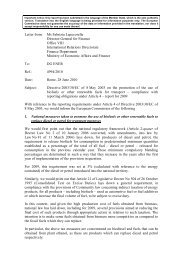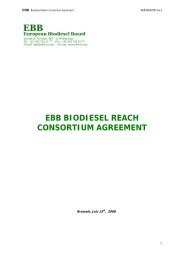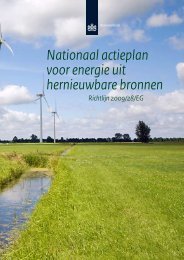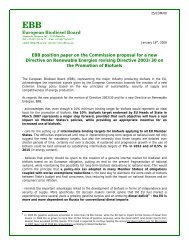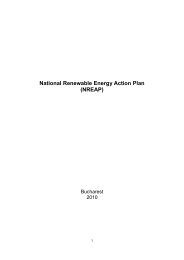EBB - European Biodiesel Board
EBB - European Biodiesel Board
EBB - European Biodiesel Board
You also want an ePaper? Increase the reach of your titles
YUMPU automatically turns print PDFs into web optimized ePapers that Google loves.
445/PRO/07 <strong>EBB</strong> REPLY to public consultation of DG TREN, April-May 2007<br />
This is probably the best explanatory argument developed in the Road Map itself in favour of a very<br />
simple and clear reporting mechanism under a future certification scheme for biofuels (and biomass for<br />
bio-energy).<br />
Additionally today, due to the various support schemes existing at national level, a real <strong>European</strong> internal<br />
market for biofuels does not exists.<br />
This aspect is again underlined in the Road Map which indicates that in the bio-energy sector “the<br />
development recorded so far is made up of generally patchy and highly uneven progress across the<br />
EU » 11 .<br />
<strong>EBB</strong> believes that a certification scheme on biofuels (and bio-energy) should not add up to<br />
the complication of the biofuels sector and should not increase the fragmentation of the<br />
market and support schemes in the different Member States.<br />
For this reason it is highly recommendable to create a single EU scheme relying on certificates issued and<br />
verified by a single <strong>European</strong> accreditation body. Such body should preferably enforce the easiest form of<br />
“book and claim” system for land use purposes.<br />
For this same reason, it is highly recommendable not to add other sustainability criteria to the ones<br />
already listed in the “possible way forward”, to avoid the risk of increasing the complication of the<br />
system.<br />
The <strong>European</strong> Commission, in its “possible way forward” indicates 4 possible options of ensuring that the<br />
sustainability criteria are met:<br />
Option 1<br />
EU Member States schemes accredited by comitology<br />
As highlighted above, <strong>EBB</strong> believes that a situation where 27 different schemes would be enforced would<br />
damage the creation of an internal market and endanger the future development of biofuels. It would<br />
also be contradictory with the simplification objectives indicated in the Road Map aiming at eliminating<br />
the uneven nature of biofuels policies across Member States.<br />
However, should this option become the preferred solution as a “way forward”, it would be necessary at<br />
least that the principle of mutual recognition of certification schemes fully applies. In this<br />
perspective it would be crucial that the new legislation legally provides in a very explicit manner that<br />
Member States’ biofuels support scheme shall not require exclusive compliance with the correspondent<br />
national certification scheme, but that compliance with any national biofuels scheme accredited by<br />
comitology is enough to access to national detaxations/obligations systems.<br />
Option 2<br />
International (voluntary) schemes accredited by comitology<br />
Voluntary schemes such as the Roundtable on Sustainable Palm Oil (RSPO) and the Roundtable on<br />
Responsible Soy (RTRS) should be considered as an interesting pattern on which an EU-wide certification<br />
scheme could be drafted. These systems include many other aspects beyond GHG impact and land-use<br />
(social criteria, child labour, etc.) and in this sense they could not be used as such.<br />
They should however be positively included in the elaboration of an EU system and eventually accredited<br />
contemporarily in all Member States as a possible basis for compliance. An EU scheme should also be<br />
supportive of the efforts undertaken in the framework of these international schemes.<br />
11 ibid., page 5<br />
- 7 -



